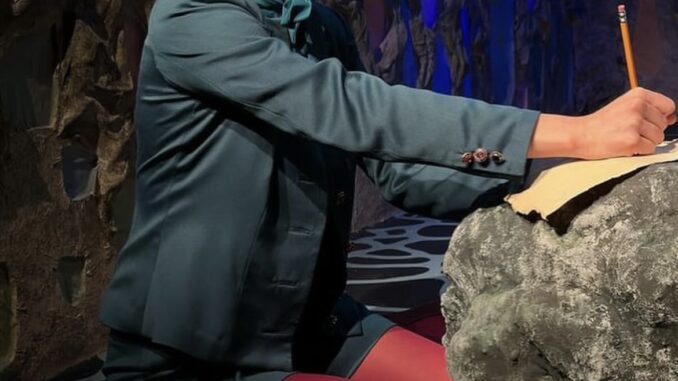
By Paulina Gajewski
From Friday, Feb. 23 to Tuesday, Feb. 27, the Brooklyn College Department of Theater put on “Eurydice.” Guests were welcomed into the New Workshop Theater, a black box theater designed to accommodate both front-facing productions and performances in the round. Directed by Cassidy Kepp, the show was an adaptation of the original myth by various ancient figures and performed by an assortment of BC acting students.
Cassidy Kepp is a “global theatre collaborator who creates safe spaces to tell stories that question society’s view of gender and sexuality,” according to her mission statement. She is a member of the Master of Fine Arts Directing cohort at BC.
Orpheus was known as the most talented musician, with an enchanting voice and an affinity towards instruments that could make even stones cry. No god nor mortal could resist his music. In one of his audiences, a nymph named Eurydice was drawn to Orpheus’ music, and the two married shortly after.
In the most common versions of the myth, Eurydice was bitten by a venomous snake. Orpheus was engulfed by his grief and decided to travel to the Underworld to retrieve his wife. Standing in front of Hades and Persephone, rulers of the Underworld, he produced a song so moving that even the most cold-hearted of the gods wept.
They allow Orpheus to return with Eurydice following behind him on one condition: that he not look back at her. As Orpheus began walking, he could hear his wife’s footsteps behind him. As he was about to approach the entrance back into the living realm, he turned around, disobeying the condition. His wife fades into the abyss of the Underworld, and Orpheus spends the rest of his days woefully wandering the earth until his eventual death.
The adaptation by Ruhl took some liberties in its changes to the original myth. The front of the stage was set with a mountainous backdrop as the first two characters, Orpheus (played by Bachelor of Fine Arts actor Isaias Morales) and Eurydice (played by BFA actor Frances Porter) appear on the staircase set against the mountains.
The floor of the stage was awash with blue light and stone as the sounds of waves crashing against the shore echoed across the theater. The two lovers were having a picnic by the seaside. Eurydice yearns to speak about her books, while Orpheus wants to write and play his music. “I don’t need to know about rhythm,” Eurydice proclaims in response to Orpheus’ request to recite a melody. “I have my books.” Ruhl craftily incorporated a discrepancy between the two, diverging from their perfect relationship in the myth.
As they meander across the beach, a man approaches the staircase, depicted by NYC-based actor Evan Moore-Coll. As he begins to recite a letter, it is revealed that he is Eurydice’s father, trying to contact her from the dead. The addition of this character deviates from the myth as well.
Eurydice enters the stage in a stark white wedding dress, spewing complaints about Orpheus leaving her with the guests on their wedding day. A man emerges, dressed in a trench coat with a green streak running through his hair, played by Ali Hosseini, and approaches Eurydice. He reveals that he has a letter from her father, but will only hand it to her if she follows him to his apartment.
In a series of attempts to seduce her, Eurydice denies them and makes her way out, tripping and falling to her death on the way out. She arrives at the land of the dead through a rickety elevator, a suitcase in one hand and clenching an umbrella in the other. She cannot speak nor cry and is met by three stones played by BC actor Sam Rodriguez, and BFA acting students Natalia Soto and Josabeth Simisterra.
She also meets her father, though she cannot recount who he is. She cannot remember anything from her mortal life, including Orpheus. Her time in the Underworld is spent with lessons from her father to induce her memories, and harassment by the Lord of the Underworld, also played by Hosseini, though this time as a relentless, irritating child.
In the land of the living, Orpheus attempts to send messages to Eurydice. He eventually resolves to go to the Underworld and bring his wife back. The Lord of the Underworld agrees, and in typical myth fashion, with one condition, that he does not look back. Eurydice yells Orpheus’ name out, causing him to look back, and commencing an argument between them.
Eurydice returns to the Underworld, only to find that her father has died a second death. She proceeds to do so as well, composing a letter to Orpheus. He, however, makes his way to the Underworld, but on his arrival, he cannot remember.
“This is what it is to love an artist,” Ruhl writes. “He is always going away from you. Inside his head, there is always something more beautiful.”
You can find information on the cast and show at http://brooklyncollegetheaterplaybills.org/EurydicePlaybill.pdf.
